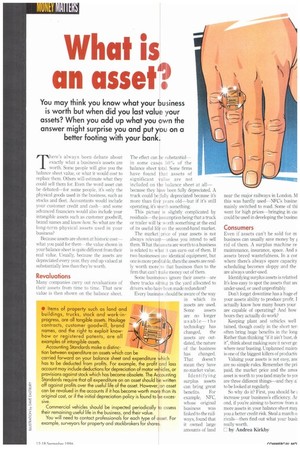What is an asset?
Page 45

If you've noticed an error in this article please click here to report it so we can fix it.
There's always been debate about exactly what a business's assets are
worth. Sonic people will give you the balance sheet value, or what it would cost to replace them. Others will estimate what they could sell them for. Even the word asset can be debated—for some people, it's only the physical goods used in the business, such as stocks and fleet. Accountants would include your customer credit and cash and some advanced financiers would also include your intangible assets such as customer goodwill, brand names and know-how. So what are the long-term physical assets used in your business?
Because assets are shown at historic cost— what you paid for them—the value shown in your balance sheet is quite different from their real value. Usually, because the assets are depreciated every year, they end up valued at substantially less than they're worth. The effect can be substantial— in some cases 50°0 of the balance sheet aal. Some firms have found that assets of significant value are not e balance sheet at all— we been fully depreciated. A fully depreciated because it's years old—but if it's still operating, it's rlorth something.
This picture is slightly complicated by residuals—the tIssumption being that a truck or trailer will Ii' worth something at the end of its useful life on the second-hand market.
The market ; price of your assets is not always relevant—unless you intend to sell them. What theassets are worth to a business is related to wlat a can earn out of them. If two businesseti use identical equipment, but one is more profital i le, then the assets are really worth more to that business than to the firm that can't make money out of them.
Some businesses ignore their assets—are there trucks sittirtz in the yard allocated to drivers who have b...en made redundant?
Every busi I hould be aware of the way in which its assets are used. Some assets are no longer usable—the technology has changed, the assets are outdated, the nature of the business has changed. That doesn't mean they have no market value. included on t because they Ii truck could be more than fiv Identifying surplus assets can bring great benefits. For example, NFC, whose original business was linked to the railways, found that it owned large amounts of land near the major railways in London. M this was hardly used—NFC's busine mainly switched to road. Some of thi went for high prices—bringing in cat could be used in developing the busine
Consumers
Even if assets can't be sold for m business can usually save money by j rid of them. A surplus machine re maintenance, insurance, space. And s assets breed wastefulness. In a cor where there's always spare capacity. scheduling becomes sloppy and the are always under-used.
Identifying surplus assets is relative] It's less easy to spot the assets that arf under-used. or used unprofitably.
Don't forget downtime has a huge ef your assets ability to produce profit. I actually know how many hours your are capable of operating? And how hours they actually do work?
Keeping plant and vehicles well tamed, though costly in the short ten often bring huge benefits in the long Rather than thinking "if it ain't bust, ck if', think about making sure it never ge where near busting. Unplanned tnaintt is one of the biggest killers of productii; Valuing your assets is not easy, am are no simple rules. Remember the pri paid, the market price and the amot asset is worth to you (and maybe to yoi are three different things—and they a' to be kxiked at regularly.
So why do it? First, you should be increase your business's efficiency. Ar ond, if you're aiming to borrow from a more assets in your balance sheet may you a better credit risk. Steal a march o rivals then find out what your bush really worth.
C by Andrea Kirkby






















































































































